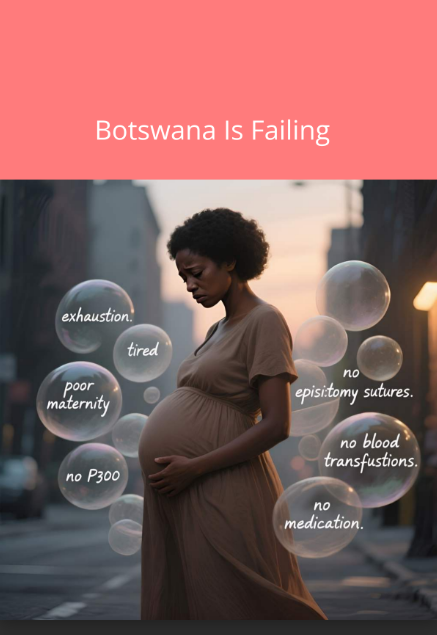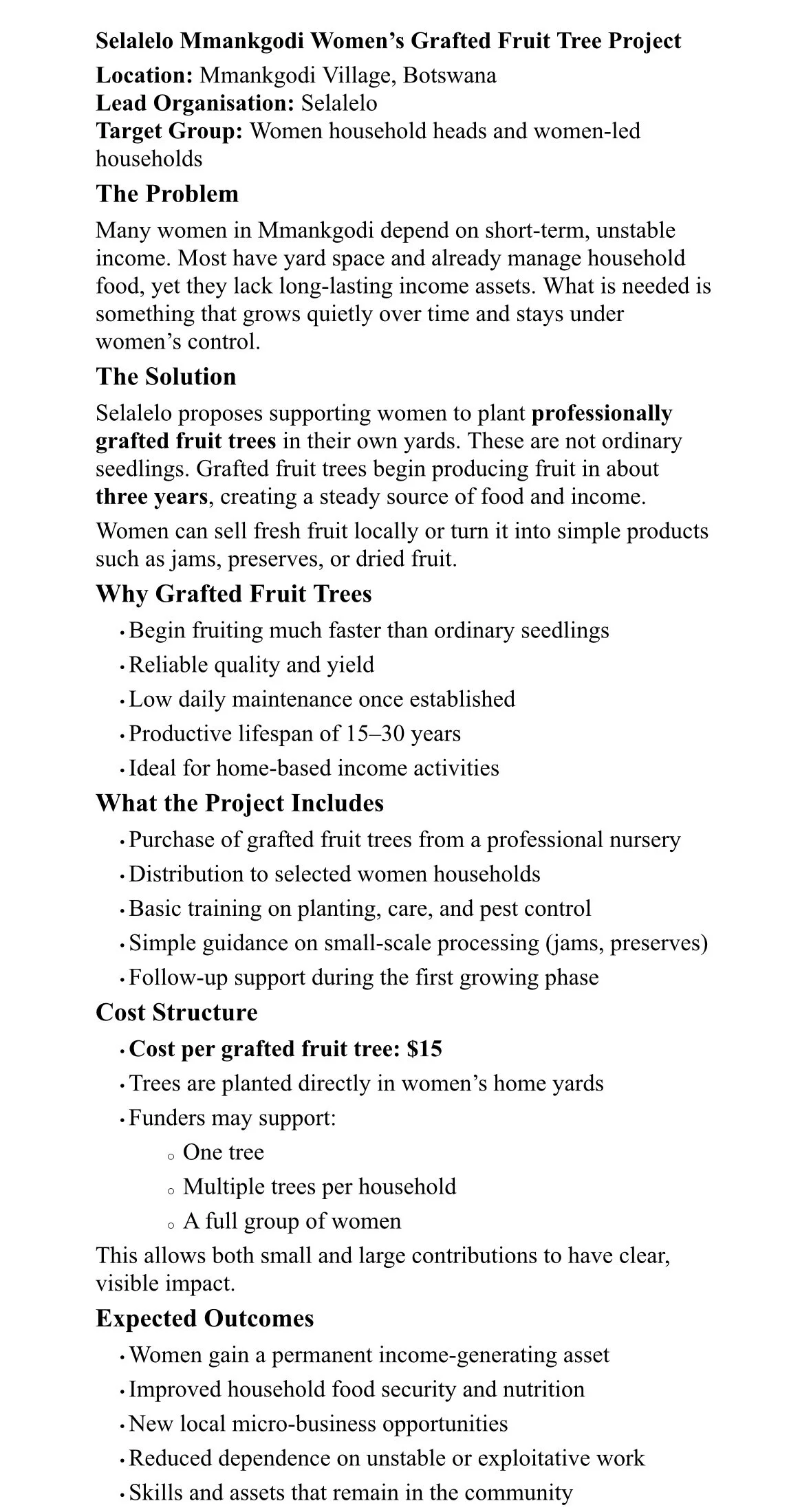
Videos & Articles
Botswana is Failing
Selalelo Mmankgodi Women’s Grafted Fruit Tree Project
Baking Women
Genocidal Rhetoric
“He Almost Killed Me — and They Told Me to Go Back”
In this deeply moving episode of Selalelo Conversations, host Merapelo Letebele speaks with Kemmy Mpinang, a woman whose life has been defined not by tragedy but by transformation. Orphaned as a girl, abused by caretakers, and trapped in an early marriage that nearly cost her life — she refused to let her story end there. She turned her pain into purpose, writing The Journey, a book that is now being adapted into a film. Today, she is a gender activist and advocate against gender-based violence, fighting for the dignity and safety of women everywhere. 🔸 Watch as she shares the truth behind her survival. 🔸 Listen to her message for women still trapped in silence. 🔸 And join us in breaking the generational cycle of gender-based violence. #SelaleloConversations #GenderBasedViolence #TheJourney #WomenRise #BotswanaWomen #EndGBV #SurvivorStories “He Almost Killed Me — and They Told Me to Go Back”
From Orphan to Empowerment: Daphney Phama on Resilience, Womanhood & Botswana’s Future
In this powerful Selalelo interview, Botswana educator and empowerment strategist Daphney Phama shares her journey from losing both parents in high school to becoming a devoted mother, teacher, entrepreneur, and community leader. Daphney speaks with raw honesty about grief, resilience, and the determination to build a life of dignity and purpose — not just for herself, but for the children and communities she serves. She discusses: ✨ Surviving orphanhood and choosing strength ✨ Womanhood beyond marriage and motherhood ✨ Raising children with love and truth ✨ The crisis facing Botswana’s youth — drugs, entitlement & lost values ✨ The collapse of traditional initiation systems and the impact on society ✨ Her entrepreneurial journey and why financial independence matters for women ✨ Hope, faith, and the importance of women supporting each other Daphney’s story is a reminder that adversity can be a seed for greatness — when watered with determination and purpose. A must-watch for young women, educators, parents, and anyone passionate about Botswana's social future. 🇧🇼 👉 Subscribe to Selalelo for more conversations rebuilding Botswana’s moral and cultural foundation. 👉 Join the movement to empower Batswana youth and revive purposeful community values. 🎤 Featured Guest Daphney Phama — Teacher, Entrepreneur & Women Empowerment Strategist 💬 Hashtags #Selalelo #BotswanaWomen #WomenEmpowerment #EducationInBotswana #YouthDevelopment #OrphanToLeader #BojaleIgnite #BogweraRising #Botswana
Life After Diamonds Sennye Obuseng Mulls Over Botswana's Next Chapter
In this thoughtful and timely conversation, Selalelo founder Merapelo Letebele sits down with renowned economist Sennye Obuseng to examine Botswana’s economic crossroads and the future we must build beyond diamonds. Botswana’s diamond industry , once the backbone of national prosperity, is facing global headwinds and unprecedented decline. What comes next will demand courage, innovation, and the strengthening of our democratic foundations.
Voices from Exile Rev Dr Rupert Hambira Demands Justice for the Herero Genocide from Germany
History must be told, and retold, until justice is done. In this powerful Selalelo Conversations interview, Merapelo Letebele speaks with Rev. Dr. Rupert Hambira, a theologian and descendant of the Herero genocide survivors who found refuge in Botswana. His groundbreaking PhD, The Missional Calling of the Church in Post-Genocidal Societies, exposes the moral and spiritual void left by the genocide of 1904–1908 — and calls for urgent reparations and recognition for those long excluded from the Germany–Namibia dialogue. Hambira’s concept of Historical Diasporic Dispossession Syndrome (HDDS) captures the intergenerational trauma of Herero descendants who remain displaced, their stories largely forgotten by official history. He argues that both the Church and the international community must act to restore dignity, justice, and historical truth.
The 1659 Cape War and the Dutch Betrayal of the Khoikhoi
Social Justice For A Fairer Botswana
Bogwera Rising
Social Justice For A Fairer Botswana
Botswana’s Agricultural Surrender
The Forgotten Genocide Next Door
The Taboo Broken
State of Womanhood
From Tradition to Tomorrow
South African National Dialogue
Borders Exclusion
We Demand A Society Where Equity Replaces Patriarchy
Silent Strength
Breaking Barriers Yvonne Chilume & Marang Keorapetse on Womanhood, Law, and the Future of Botswana
"Join Selalelo for an inspiring conversation with two of Gaborone’s female attorneys, Yvonne Chilume and Marang Keorapetse, as they share their journeys navigating the legal profession in a male-dominated field. In this interview, they discuss: The challenges and triumphs of being women in law The intersection of patriarchy, motherhood, and career Social equity and advocacy for women and marginalized groups Lessons and guidance for the next generation of Batswana women Discover their personal insights, professional experiences, and vision for a Botswana where women’s voices are equally represented and respected at every table.
Lessons in Inclusion: Empowering Women & Building Black Unity | Selalelo x Inclusive Communities
In this interview, Selalelo learns from Cammy, Executive Director of Inclusive Communities in Omaha, about building inclusive societies, fostering leadership, and empowering women in patriarchal systems. We discuss practical strategies Selalelo can apply in Botswana, including: Amplifying the voices of Batswana women Challenging cultural and structural patriarchy Creating spaces for dialogue and inclusion Strengthening networks for Black unity across Africa and the diaspora Leadership and community-building lessons for lasting social impact This conversation is a bridge between local action and global insight, showing how collaboration, dialogue, and empowerment can transform communities. Subscribe to Selalelo to stay updated on our initiatives, including youth programs, women’s empowerment campaigns, and social justice discussions. #Selalelo #InclusiveCommunities #WomenEmpowerment #BlackUnity #Botswana #SocialJustice #CommunityLeadership #Leadership #Empowerment"
“Comedy Meets Conscience: Lentle Makhwaje on Gender Equity - balances humor and activism powerfully.
In this bold and refreshingly honest conversation, Selalelo sits down with rising stand-up comedian and psychology student Lentle Makhwaje to unpack what it means to grow up as a young man in Botswana — a society where patriarchy still shapes every major decision. From gender equity to gender-based violence, Lentle uses both wit and insight to reflect on the silent pressures placed on men, the unchecked power they hold, and the urgent need for young Batswana to rethink masculinity. 📍 This interview is part of Selalelo’s national movement for social justice. In Botswana, we cannot blame racism for inequality — we must look within. And often, what we see is male-dominated systems that continue to silence, harm, and disadvantage women and girls. Selalelo is about changing the conversation — one voice at a time. Let’s talk. Let’s laugh. But let’s never ignore the truth. 👉 Subscribe and follow us as we build a gender-just Botswana. #Selalelo #GenderEquity #BotswanaVoices #LentleMakhwaje #EndGBV #SocialJustice #Masculinity #standupforchange
HIV, Inequality, and the Silent Epidemic Among Batswana Women | Selalelo Interview
In this episode of Selalelo — a platform usually devoted to African unity and regional integration — we pivot to an issue that strikes at the heart of our public health and social fabric: HIV.
Our guest, Lentlametse Mantshonyane, is a PhD candidate, epidemiologist, and lead author of the groundbreaking study: “Universal Test and Treat for HIV Had Little Effect on Outcomes, but Missed Clinic Visits Threaten Success of Botswana’s National ART Program.”
In this revealing conversation, Mantshonyane:
• Breaks down why Botswana’s bold HIV policy shift in 2016 didn’t deliver the expected results.
• Exposes how missed clinic visits are quietly derailing the national response.
• Reflects on the gendered realities of the epidemic — and why Batswana women bear the heaviest burden.
• Offers insights for African countries seeking sustainable, community-based HIV solutions.
⚠️ This is more than a health discussion — it’s a wake-up call for policy makers, civil society, and families.
🎧 Tune in. Reflect. Share. The fight against HIV is far from over, and every conversation matters.
🔗 Subscribe to Selalelo — where African voices ignite African change.
Dogs of an Empire
KING & SERVANT
By Merapelo Letebele
Femicide
By Merapelo Letebele
A'Jamal discusses Africa, the impact of racism, and the need to address it with African advocacy.
This is a hard-hitting program aimed at Africans and African Americans to step up their games and stop making these sister city trips without tangible outcomes. For example, in Omaha, NE, many political figures and elites are offered paid trips to Ghana. With each trip, there should be reciprocity and exchanges to demonstrate that their paid journeys are not trips to get sell-out behaviors. If one is not paying for their trips or helping to improve the quality of life for the masses, then it is mere lobbying efforts from the organizers to continue the neocolonialism, and supporting the funders' efforts or desires. We focus on Southern African countries because they share many experiences that African Americans experienced with racism,
Merapelo Letebele interviews a citizen of the DRC in Botswana about his experiences.
Shana interviews Eddey Mihigo, a 20-year resident of Botswana. He is from the Democratic Republic of the Congo (DRC) and has lived in various countries with his parents, who worked and traveled extensively. He is an artist and works with young men in one of the local programs. This program offers many vantage points or perspectives of what it is like to live as an African in another African country. Although Botswana is not experiencing the high level of African migration to their country that South Africa is, this program demonstrates how Africans should treat foreigners when they are gainfully employed, with families, and not committing crimes or becoming unwanted in the country they are visiting.
Merapelo Letebele talks about topics affecting Africans, the impact of racism, & families.
This program examines the crisis in South African countries and the impact of the administration's decision to cut foreign aid, to see if families, local and government agencies, and NGOs will step up their efforts. This also provides Africans with a roadmap to initiate conversations with African Americans, enabling a balance to be achieved by supporting grassroots and low-income families who lack access to water in their homes and face additional challenges, including social justice issues. We also expect the elites and wealthy folks in the country to work on community engagement with the masses locked at the bottom.
Selalelo with Keineetse Daniel Keineetse | Pariah States, Patriarchy, Global Racism & Politics
Botswana is facing a silent but spectacular collapse — not of buildings or borders, but of values. The old ways of communal raising, respect, and moral grounding are fading fast in the face of unchecked modernity. What remains is a brittle society, fractured by disconnection, ego, and emotional burnout. In this bold and energizing episode of Selalelo, we sit down with a wellness and fitness coach whose voice defies stereotypes and whose vision challenges the norm. Misunderstood by many, she is a powerhouse of healing, mental strength, and unapologetic self-discipline. We ask: Can personal wellness be the anchor in a society losing its moral compass? Is it possible to raise a new generation with tools that speak the language of today — without abandoning our roots? This conversation is not just about fitness. It’s about rebuilding the self, the home, and the nation — one breath, one choice at a time. 👉 Watch. Reflect. Rebuild. 🎧 Selalelo – Justice, reimagined for the modern age.
Boitumelo’s Story – When Orphanhood Becomes a Life Sentence
Boitumelo’s Story – When Orphanhood Becomes a Life Sentence In Africa, injustice doesn’t always wear the face of racism — here, it’s often patriarchy that wounds the deepest. In this moving episode of Selalelo, we meet Boitumelo Ntwayamodimo, a woman shaped by loss, abuse, and resilience. Orphaned at 10, burdened by family servitude, and living with HIV, Boitumelo’s life reveals the silent, crushing legacy of asocial inequity. Her voice is a mirror to the lives of many African women — unseen, unheard, yet unbroken. This is not just her story. It is our reckoning. 👉 Watch. Share. Remember. 🎧 Selalelo – Justice, in our own voice.
Four Centuries of Theft and Unfinished Reckoning in South Africa
Selalelo with Keineetse Daniel Keineetse | Pariah States, Patriarchy, Global Racism & Politics
In this thought-provoking episode of Selalelo, Keineetse Daniel Keineetse unpacks critical issues shaping Southern Africa and the world at large. From the concept of a pariah state and its impact on regional integration in Southern Africa, to the deeply entrenched problem of patriarchy and its destructive consequences, this discussion challenges the status quo.🔥 But that's not all—Keineetse also dives into the global politics of racism, exposing how historical and contemporary power structures continue to shape international relations, economic disparities, and social injustices. As geopolitical tensions rise and nations navigate complex alliances, what role does Southern Africa play on the world stage? How do local struggles connect to global oppression?📢 Join us as we engage in hard-hitting, unapologetic dialogue about power, identity, and justice. This episode is a must-watch for anyone passionate about African unity, gender equality, and dismantling global injustices.👉 Don't forget to like, comment, and subscribe for more bold discussions that challenge the narrative and spark new perspectives!
THE CENTRAL AFRICAN SLAVE TRADE
The ongoing struggle for racial justice often seems like an exaggeration to those who remain ignorant of history.
Selalelo talks to a Rhodesian Apartheid survivor, Bridget Marope.
Bridget Marope shares her life experiences in the three Southern African countries she has lived in. Her story is one of great insights on regional integration, migration, mass deportations of immigrants from the US, and the less known Apartheid of former Rhodesia, now Zimbabwe. As we embark on new journey dealing with issues in Southern Africa it is critical that we hear the voice of women, and those who will be affected by the policies of racism, xenophobic (fear and hatred of strangers or foreigners) and most of us the denial of toxic patriarchy mentality of leadership in these respective countries. As that old saying goes, those who are closer to the problems are closer to the solutions. We must involved the voices of those most impacted by these changes.
The White Man’s Dirty Fingerprints in CKGR.
Elon Musk’s Ancestors
Merapelo Letebele interviews Attorney Sidney Pilane about patriarchy and issues of the day.
There are new political leadership in Botswana and Southern African countries. Mr. Sidney Pilane, who studied in Europe, Africa, and the United States, shares his perspectives on issues of the day. He is considered one of Botswana's most acute legal minds and has advised various presidents. He has also played a significant role in helping with leadership in South Africa. As an elder statesmen in the country, many seek his wisdom, and he is not afraid to challenge systems, institutions, and individuals related to justice for Africans within his circle of influence. He also talked about the role of women in society and the challenges many face in achieving social and political equality.
Herzon Maina Warui talks about the challenges of corruption, education, and issues in Kenya.
This interview provides an overview from an Indigenous Kenya about his country. We explore the current political and social administrations. Herzon tells the viewer what to expect when visiting Kenya and from the eyes or experiences of Grasstop residents of the country. We discuss African culture and how one captures the critical points of visiting the continent for those who enjoy other cultures
Merapelo Letebele, Coordinator of Selalelo discusses womanhood in patriarchy society in Botswana
Three Batswana young women discuss the status of womanhood in Botswana, touching on dating violence, security concerns the legacy of patriarchy.
A Conversation about the Kingdom of LESOTHO Challenges and Issues Affecting the Population.
Joseph Setlaba and Tsebo Fobo talked about the Kingdom of Lesotho. A country in Southern Africa faces challenges dealing with nepotism and the inability to engage the population to higher income levels. Joseph studied in the Eastern Bloc countries in Europe and experienced racism. Ms. Tsebo is retired from the Ministry of Finance. She worked in finance and understood the challenges the youth and citizens face in Lesotho. Merapelo Letebele, the host, offers a comparison to Southern African counties and the impact of race relations and the social climate of apartheid on counties where the majority of its citizens are Black and truly under the apartheid system. Lesotho and Botswana are considered sister countries because they speak a similar language. Both countries have small populations, with less than three million people. The guests talk about gender equality in their countries.
Manxoba Nxumalo (Swaziland) is interviewed by Merapelo Letebele from Selalelo about Eswatini.
This program explores issues, from women's rights in Eswatini to the role of the Monarchy and its powerful impact on the culture. Merapelo Letebele, the host and coordinator of Selalelo, interviews Manxoba Nxumalo from Eswatini to unpack the complexities of Southern Africa's past and pave the way for a more inclusive future. Selalelo, is a platform where African ideas converge. The program is dedicated to exploring the profound impact of colonialism, global racism, gender dynamics, regional integration, and the question of African unity. There is discontent among the citizens on political issues. There are questions about the murders of political opposition leaders to that system of oppression. This landlocked nation is the only African country ruled by a Monarchy leader who has many wives.
African women from various countries talk about patriarchal and sexist culture in their circles.
Merapelo Letebele, Selalelo Program Coordinator, interviews African women who have unfiltered conversations about their treatment in various countries. They also challenge male chauvinism in the 21st century in African nations. They also make the argument that the treatment of women is akin to the enslavement of Blacks. As they discuss such roles, they aim to help women achieve parity and equity in these societies and communities and stop the oppression of women by misogynist men.
Call & Response Book Discussion
Over the years, the Movement in Omaha for Racial Equity (MORE) has hosted book discussions featuring various authors. During March, which is Women's History Month, we are hosting a book discussion with author Ms. Gothataone Moeng. Her book is Call and Response: Stories. This book is a collection of short stories about family life in Botswana.
Alleged Poaching in Namibia
Today, three Namibians are here to “throw down some heavy light.”
Sinvula Mudabeti is the National Executive Chairperson for the Namibian Lives Matter Movement. He is a keen advocate for social justice and known as a community
or national organizations dealing with various entities in Namibia.
Iuze Mahunga is an Committee Member of Namibian Lives Matter in the Omusati Region.
Sylvester Kabajani is the General Secretary and Member of the Namibian Lives Matter Movement in the Khomas Region. He is also a professional Cisco-certified cybersecurity analyst, business coach, and former Namibia Financial Institutions Union president.
Mmankgodi women talk about their struggles in Botswana.
This program talks about orphanhood, child labor abuses, and how African girls and women live in an oppressive system that does not support families to thrive. The Coordinator of Selalelo interviews the village women about issues that need to be addressed to transform their lives.
Zambian immigrants in Botswana discuss colonialism, racism, African unity, and gender relations!
Merapelo Letebele, Coordinator of the MORE Selalelo Southern African Project, interviews and talks about ethnic and racial issues affecting many residents. This interview gives an overview of the challenges Africans face on the continent.























